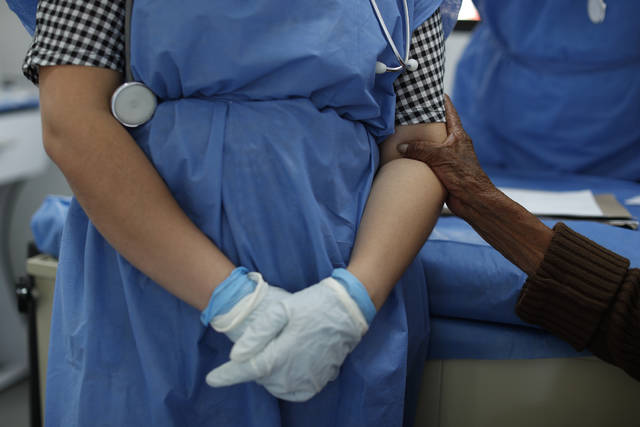Alessandra Hirsch: A GI Bill for health care workers
Alessandra Hirsch, M.D., is a first-year resident physician in obstetrics and gynecology in Chicago, Ill.
On Sunday, March 15, the single day that I was given to adjust from a full month of working overnight to my next rotation in gynecologic surgery, I received an email with new instructions: all residents would now be on a “covid-19” schedule. In a few hundred words, a new reality familiar now to all of us sunk in. A reality of canceled plans and missed relatives, of postponed weddings and Zoom Seders and, in the case of myself and my colleagues, of parking lot masks and face shields, of fear and sweat, of wondering if every small cough was an augur of the virus, of The Ultimate Worry — that we will infect our loved ones and make them sick.
In this new reality, I am considered a “hero” for going to work. I am applauded every night by my neighbors who have somehow managed to obtain air horns and microphones, who revel in the thank-yous and at whom I cannot help but smile.
“Maybe I am a hero,” I think to myself. I try to compare — Superman, armed with his superhuman strength, tried to live his quiet Kansan life until the big city and the bigger baddies made it impossible not to fight. Batman attempted a reclusive existence until his city’s corruption could no longer be ignored by his immense wealth. I have neither super-power nor unlimited resources. I am not Immune System Woman and therefore I am not compelled by an inner talent to fight our common Covidian enemy.
Nor was this a choice. Nowhere in that email of March 15 was the option given: Do you choose the life of the hero? Do you choose to go into battle? We cannot promise proper armor and we have paltry ammunition. All this considered: Will you join the fight?
I’m a resident physician. We are, in many ways, the lowest rung on the hospital ladder. Paid less than $15 an hour, working 80 hours per week, we have limited ability to advocate for ourselves. Eighty-one percent of us have student loans, and our average loan amount is about $200,000. We are almost never given the option of when to work nor where. In fact, our workplaces are chosen for us by a black-box algorithm that won the Nobel prize.
There exists, however, a system to properly compensate people who work in unsafe work environments — this is called hazard pay. Fishermen, roofers, steelworkers and miners are often eligible. Yet somehow, the idea that residents would be given hazard pay is laughable. Our base pay is so incomparable to our level of education, our time so wildly undercompensated, that the concept that our hospitals would now, in the face of fewer elective surgeries and thus lower revenues, pay us more, is hard to imagine.
Some hospitals like Northwell Health in Long Island, N.Y., and Yale Hospital in New Haven, Conn. are offering health care workers pay bumps. But the truth is that adequately compensating health care workers for confronting a plague should not be up to individual hospitals — many are inadequately funded, and should not have to choose between purchasing ventilators for sick patients and supporting their residents. Those of us who were algorithmed to a wealthy hospital system are not more deserving of compensation than those of us who were not.
That leaves the federal government and a clear path forward: Forgive health care workers their student debt. Debt forgiveness will work as both a practical and a symbolic form of hazard pay. For the vast majority of us who have student debt, we will again have to worry about how to pay it off once this crisis is over. The Public Service Loan Forgiveness program, which forgives debt to those who work for not-for-profit organizations after 10 years, is notoriously difficult to enroll in: 99% are denied. This leaves few options even to those who want to serve the public after years of grueling residency. Rep. Carolyn Maloney of New York this week introduced the Student Loan Forgiveness for Frontline Health Workers Act, which would forgive the debt of today’s front-line health care workers.
In the wake of this crisis, most of us will have served our country in ways unfathomable when we stood in front of our parents and recited the Hippocratic Oath. The only adequate way to thank us is to forgive our debt. For those with less owed, the forgiveness will be symbolic: a public display of thanks that our sacrifices merit more than a nightly salute. Soldiers return home to the G.I. Bill, allowed to pursue their dreams debt free. If health care providers are this war’s soldiers, don’t we deserve the same?
Remove the ads from your TribLIVE reading experience but still support the journalists who create the content with TribLIVE Ad-Free.

